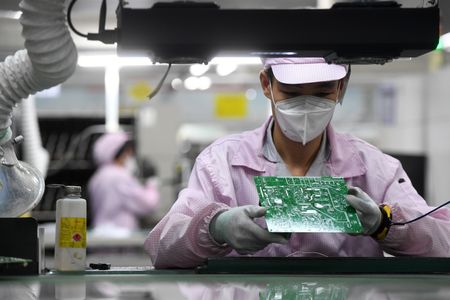By Ellen Zhang and Joe Cash
BEIJING (Reuters) -China’s factory output and retail sales grew at a faster pace in August, but tumbling investment in the crisis-hit property sector threatens to undercut a flurry of support steps that are showing signs of stabilising parts of the wobbly economy.
Chinese policymakers face a daunting task in trying to revive growth after a brief post-COVID bounce in the wake of persistent weakness in the crucial property industry, a faltering currency and weak global demand for its manufactured goods.
Industrial output rose 4.5% in August from a year earlier, data released on Friday by the National Bureau of Statistics (NBS) showed, accelerating from the 3.7% pace in July and beating expectations for a 3.9% increase in a Reuters poll of analysts. The growth marked the quickest pace since April.
Retail sales, a gauge of consumption, also increased at a faster 4.6% pace in August aided by the summer travel season, and was the quickest growth since May. That compared with a 2.5% increase in July, and an expected 3% rise.
The upbeat data suggest that a spate of recent measures to shore up the economy are starting to bear fruit, prompting JP Morgan to raise its forecast of China’s 2023 gross domestic product growth to 5% from prior 4.8%.
ANZ also upgraded its growth forecast for the world’s second largest economy by 0.2 percentage points to 5.1%.
Yet, a durable recovery is far from assured, analysts say, especially as confidence remains low in the embattled property sector and continues to be a major drag on growth.
“Despite signs of stabilisation in manufacturing and related investment, the deteriorating property investment will continue to pressure economic growth,” said Gary Ng, Natixis Asia Pacific senior economist.
The markets, however, showed relief at some of the better-than-expected indicators.
The Chinese yuan touched two-week highs against the dollar, while the blue-chip CSI 300 Index was up 0.2% and Hong Kong’s Hang Seng Index climbed 1% in early morning trade.
Further buoying sentiment, separate commodities data showed China’s primary aluminium output hit a record-monthly high in August while oil refinery throughput also rose to a record.
MORE POLICY SUPPORT NEEDED
Friday’s data followed better-than-expected bank lending figures, a narrowing in the declines of exports and imports as well as easing deflationary pressure.
China’s passenger vehicle sales also returned to growth in August from a year earlier, as deeper discounts and tax breaks for electric vehicles boosted consumer sentiment.
To sustain the recovery momentum, China’s central bank said on Thursday it would cut the amount of cash banks must hold as reserves for the second time this year to boost liquidity. Earlier in the day, the bank also rolled over maturing medium-term policy loans to inject more liquidity into the financial system.
But analysts say more fiscal and monetary policy steps are needed as an ailing property sector, high youth unemployment, uncertainty around household consumption and rising Sino-U.S. tensions over trade, technology and geopolitics have raised the bar for a durable economic recovery in the near future.
“The reserve requirement ratio (RRR) cut yesterday sent an interesting signal that there is a sense of urgency to boost growth,” said Zhiwei Zhang, chief economist of Pinpoint Asset Management, expecting more policies over the coming months to bolster overall demand.
Natixis’ Ng said confidence remains the root of most problems requiring larger “constructive policy and regulatory changes” to boost growth momentum.
PROPERTY DOLDRUMS
The once mighty property sector remains a drag on the $18 trillion economy, with the country’s largest private developer Country Garden the latest to stumble due to a liquidity squeeze.
The fresh industry figures provided little comfort for policymakers and investors. For August, property investment extended its fall, down 19.1% year-on-year from a 17.8% slump the previous month, according to Reuters calculations based on NBS data.
Government revenue from state land sales fell for the 20th consecutive month in August, finance ministry data showed on Friday, weighing on the already debt-laden local governments’ finances.
“We are still hopeful that housing sales would stage small sequential pickups in the coming months, but stimulus will ultimately stop short of reflating the sector,” said Louise Loo, China Economist at Oxford Economics.
Other data, also released on Friday, showed weak investor confidence, with private investment shrinking 0.7% in the first eight months, deepening from the contraction of 0.5% in January-July.
Fixed asset investment expanded at a slightly slower pace of 3.2% in the first eight months of 2023 from the same period a year earlier, versus expectations for a 3.3% rise. It grew 3.4% in the first seven months.
An uncertain business climate meant companies remained wary about hiring, but the nationwide survey-based jobless rate improved a touch to 5.2% in August versus 5.3% in July.
“Beijing may have to introduce more aggressive property easing measures to deliver a real recovery,” Nomura analysts said in a note, echoing a consensus view among China observers.
“Beijing will likely once again have to play the role of borrower and spender of last resort.”
($1 = 7.2765 Chinese yuan renminbi)
(Additional reporting by Liangping Gao, Albee Zhang and Kevin Yao; editing by Shri Navaratnam and Mark Heinrich)

